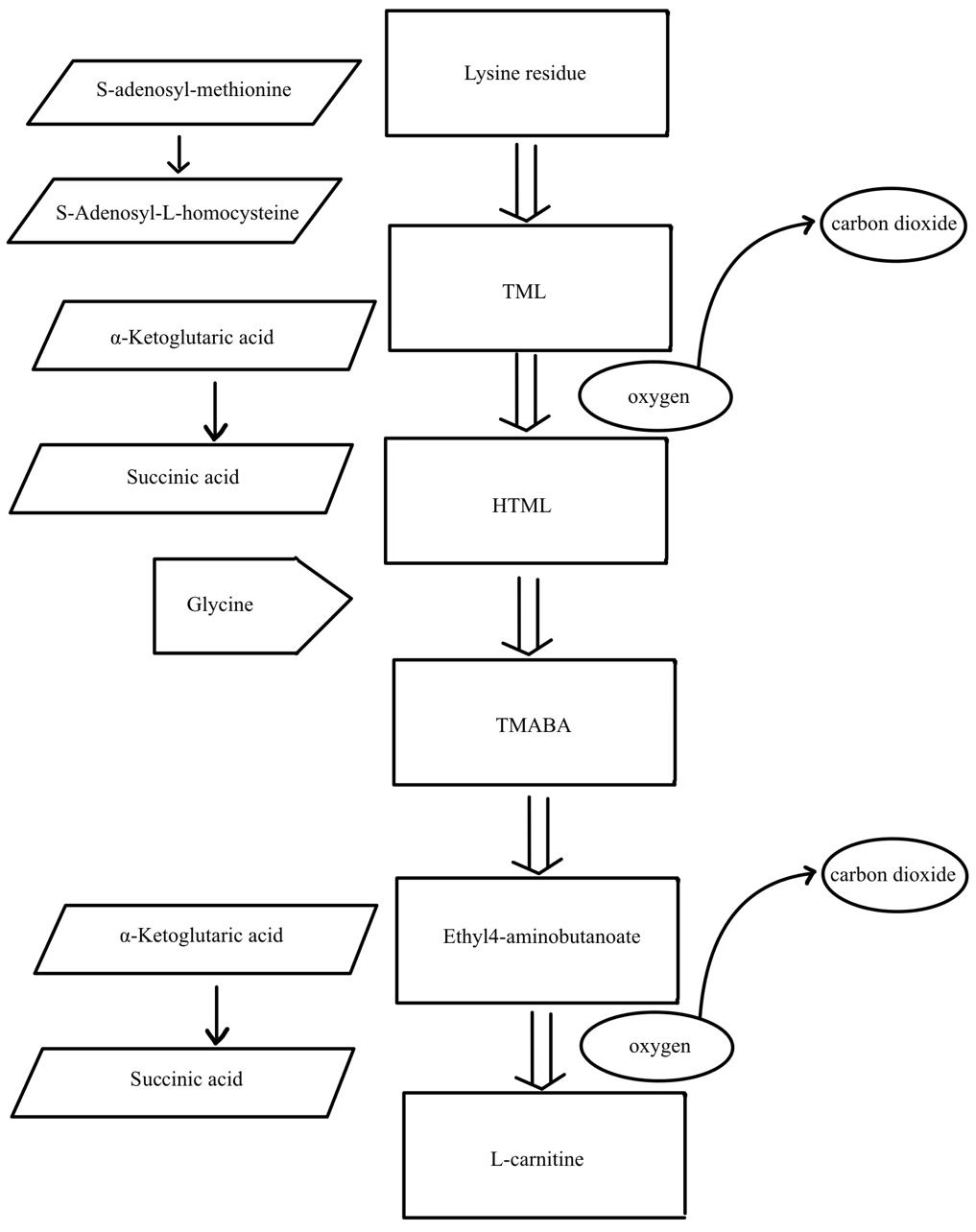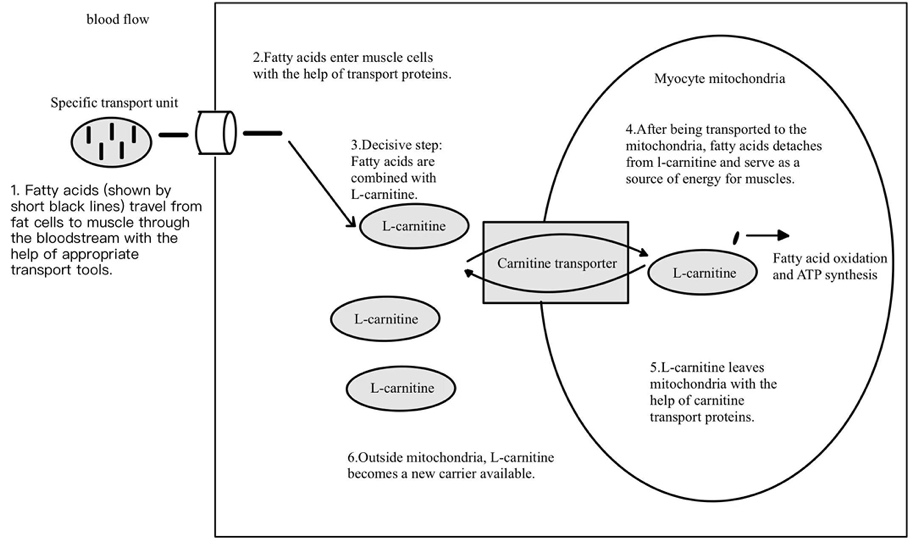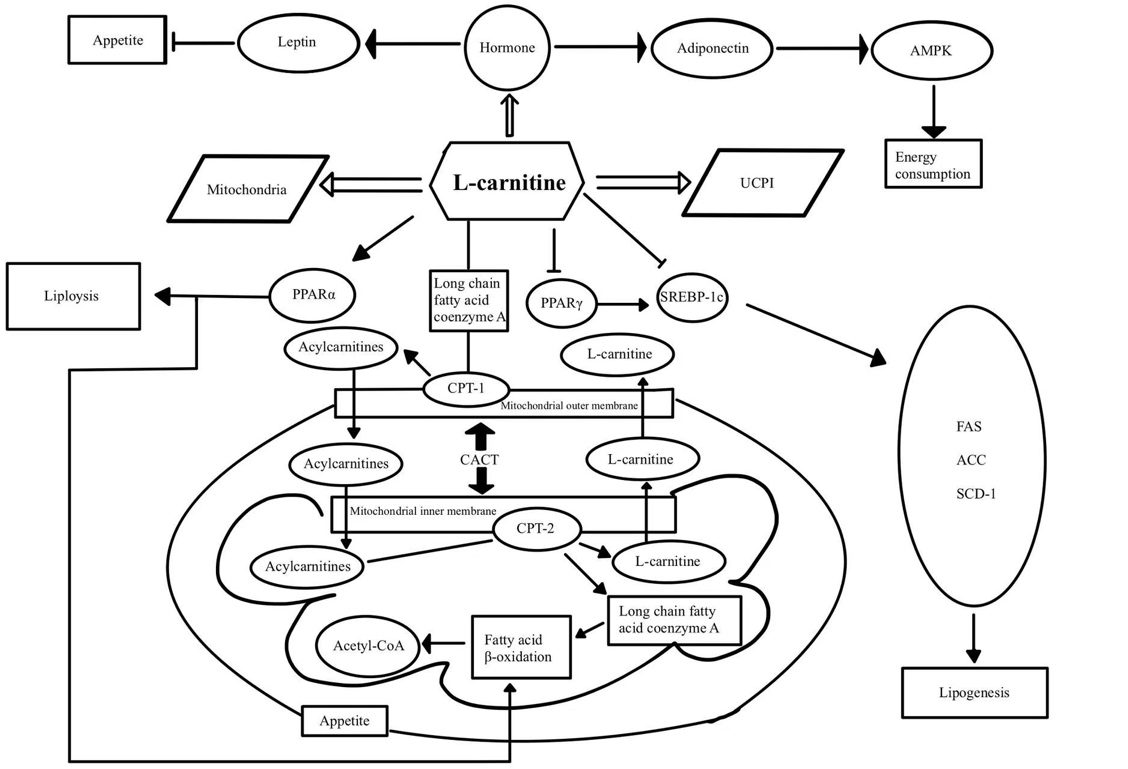1. Introduction
Overweight and obesity are one of the world's leading health factors, while they also play an important role in the progression of several noncommunicable diseases, including cardiovascular disease, diabetes, and cancer [1, 2]. According to a World Health Organization report, more than 2 billion adults aged 18 and over are overweight. In fact, obesity rates continue to increase globally, and obesity rates tend to be higher in high-income countries.
With the improvement of living standards, the continuous development of the health industry, people's requirements for the body are getting higher and higher, following fat loss training, healthy diet, drugs and surgery, a variety of anti-obesity drinks, diet pills and supplements are also widely mentioned; L-carnitine is one of the much-hyped diet pills, and manufacturers advertise its powerful weight loss benefits, inducing some people who do not have a deep understanding of their situation to eat it by mistake: they claim that it can lose weight, but still does not have a clear effectiveness to prove that. This article wants to let the public understand the actual role of L-carnitine and choose their own "health path" reasonably.
This article will summarize the relationship between L-carnitine and exercise, the mechanism of L-carnitine's ability to lose weight, the effect on the liver, and the impact on human indicators in obese people. And whether it is suitable for obese people to lose weight and the side effects to them and give advice on whether L-carnitine should be used.
2. Metabolic mechanism of L-carnitine
2.1. The Role and Synthesis Mechanism of L-Carnitine
The most important role of L-carnitine is to act as a carrier for transporting fatty acyl-CoA to the mitochondrial matrix on the inner membrane of mitochondria, allowing β-oxidation of fatty acids to provide energy for the body (Figure 1). Lactic acid is the end product of the body’s anaerobic glycolysis and is an important cause of body fatigue. L-carnitine can reduce the concentration of lactic acid produced by anaerobic exercise, relieve the accumulation of lactic acid, and avoid muscle fatigue. L-carnitine controls the value of free Co-A/Acetyl-CoA within a certain range, this ratio will inhibit the activity of pyruvate dehydrogenase and affect energy metabolism, expel acyl groups, and avoid acyl metabolism poisoning in the body [3]. Carnitine can promote the excretion of shore by reacting with ammonia in urine and prevent the accumulation of ammonia. L-carnitine is also an antioxidant that captures free radicals by preventing the formation of iron chelates. When the primary antioxidant defense barrier cannot completely remove free radicals, L-carnitine participates in the repair process, which is beneficial to repair the (cell) membrane in time. L-carnitine also has a certain effect on the absorption of fat-soluble vitamins, calcium and phosphorus. Adding L-carnitine to peritoneal dialysis fluid can improve a series of symptoms caused by carnitine deficiency in uremia patients on the one hand and improve the long-term high glucose effect of peritoneal dialysis fluid on the inhibition of peritoneal skin cell proliferation and reduce high glucose levels. Induces apoptosis of peritoneal mesothelial cells.
In body, the main physiological function of L-Carnitine is to act as a carrier of fatty acid transport, in the form of acetyl L-Carnitine, the medium and long chain fatty acids are transferred from the extramembrane membrane of the cellular mitochondria to the membrane, so that it oxidizes in the mitochondrial matrix to produce energy and improves the body's tolerance.
How to reach the target cells of the muscle is the most complex problem now. There has been speculation that long-term use of L-Carnitine will increase the amount of L-Carnitine reserves in muscle cells to a certain extent, but there is no definitive evidence to prove this. The absorption rate of carnitine from food in the human body is about 63% to 75%, while the absorption rate of L-carnitine from dietary supplements is only 14% to 20% [3]. Most of the L-carnitine in food is catalyzed by the intestinal mucosal acylcarnitine to be absorbed by the intestinal mucosa, and the rest is used or degraded by microorganisms in the intestine.
|
Figure 1. Endogenous L-carnitine synthesis pathway [3]. |
2.2. Effects of L-Carnitine on Metabolism
Lipid metabolism: Abnormal lipid metabolism can cause problems with obesity, and obesity can cause more diseases to be induced or worsened. Exercise combined with L-Carnitine supplementation promotes metabolism, improves physical condition, and reduces body fat percentage. The most important function of L-Carnitine is to perform β-oxidation in the mitochondria, promote the positive progression of the tricarboxylic acid cycle (TCA) and produce adenosine triphosphate (ATP) (Figure 2).
Amino acid metabolism: within the body, L-Carnitine is synthesized from raw materials such as methionine and valine, so it regulates by negative feedback; In addition, as a carrier, some metabolites containing branched-chain acyl groups (usually valine, leucine and isoleucine) of the mass transport, so that can accelerate the synthesis of these amino acids to achieve the purpose of accelerating metabolism.
|
Figure 2. The simple principle of action of L-Carnitine involved in intramuscular fat burning. |
3. Relationship between L-Carnitine and Exercise
3.1. Effect of Exercise on L-Carnitine Level
At present, the relatively agreed view is that the exercise process does not have much effect on the total content of carnitine in the plasma, the free L-carnitine content decreases, but the acylcarnitine (AC) content increases, and there is no obvious gap about the total carnitine content in the body between normal people in a quiet state and well-trained athletes. Xiequn Li et al. observed that the concentration of total plasma carnitine content before and after athlete training did not change, and L-carnitine is an essential cofactor of fatty acid metabolism, which can be used as a carrier to transport long-chain fatty acids from outside the mitochondrial membrane to the mitochondrial membrane for β-oxidation in the form of acylcarnitine so the content of acylcarnitine increases accordingly [4]. There is currently no conclusive as to what exactly caused this phenomenon. Exercise can affect the metabolism of L-carnitine, if it is a long-term heavy load of exercise, it can increase the discharge of carnitine in the urine. Exogenous supplementation with L-Carnitine can improve the body's ability to use fat to provide energy and prolong the tolerance time of exercise. After exercise, the concentration of L-carnitine in human muscle tissue decreases, so appropriate supplementation of L-carnitine is beneficial to improve explosiveness and enhance tolerance [5].
3.2. Effect of L-Carnitine on Athletic Ability
A certain amount of L-carnitine intake before exercise can significantly increase the maximum oxygen consumption in adults [6]. Because long-term adherence to aerobic exercise can improve the function of the respiratory and circulatory systems and enhance the maximum oxygen uptake and utilization of each cell, aerobic exercise combined with supplementation of L-carnitine supplements to promote the body's maximum oxygen uptake may accelerate the role of aerobic exercise, so that significantly increase the oxygen uptake. Experiments by Giamberardino et al. confirmed that L-carnitine can accelerate fatty acid transport rate and increase fatty acid oxidation, thereby significantly reducing body weight [7]. There is currently no unanimous conclusion on the effects of aerobic exercise supplementation with L-Carnitine. However, most opinions agree that supplementing with a certain amount of L-carnitine has a certain effect on improving aerobic exercise [8]. In addition, during extreme exercise and ultra-extreme exercise, when muscles begin to use the energy obtained under anaerobic conditions to produce lactic acid, L-carnitine can improve the body's anaerobic capacity by removing too much lactic acid.
4. Effect of L-Carnitine on weight loss
The underlying mechanism of how L-Carnitine improves obesity is shown in Figure 3. In principle, L-carnitine is a substance that does promote fatty acid oxidation, but at the same time we must not forget that we can synthesize this substance ourselves. According to Nasir Talenezhad research, through meta-analysis and inputting relevant keywords, and incorporating systematic evaluation criteria, comprehensive evaluation of weight, body mass index (BMI), waist circumference (WC), body fat percent (BFP) and body fat mass (BFM) with their standard deviations (SDs) and other body indicators, including Asia, Europe, America and other places. Its results, presented in studies with no conflict of interest or unrelated industry funding, were able to demonstrate that the use of L-carnitine-related weight loss products can influence body weight, BFM and BMI [9]. L-carnitine significantly led to weight loss (1.21kg). But it worth noting that based on the analysis showing that obese and overweight adults were more likely to lose weight and BMI in this study, L-carnitine use in normal-weight people is not very ideal [10].
L-Carnitine produces about 0.02 g per 24 hours, which in general can easily meet the daily needs of a normal person. To date, subjects in scientific studies have said that the dose of L-carnitine ingested ranges from 2g-6g, and it varies from 1 month to 6 months continuously. However, each intake of 1 to 2 g is meaningless to the human body, the maximum intake of about 18% of the total amount of L-carnitine can eventually reach the blood, considering the entire metabolic process, 1g of L-Carnitine can only use 0.08g.
|
Figure 3. L-Carnitine improves the underlying mechanism of obesity [3]. |
5. Effects of L-Carnitine diet pills (supplements)
5.1. Effect of L-Carnitine on Human Indicators in Overweight People
If the addition of L-Carnitine is really as effective as advertised, then it should be easy to find in experiments, because after a certain cycle of ingestion of L-Carnitine, the body fat rate should have a significant decrease. However, according to the results of the study, the reduction of body fat after ingestion of L-Carnitine is not so effective in practical applications [11]. Based on it again, the results of the experiment showed that among 36 women with an average age of 27 years, they were asked to take a placebo twice a day (2 g each time) or L-carnitine twice a day for two months and were allowed to exercise 4 times a week for 30 minutes each time and did not prescribe a diet. In this way, a lot of uncertainty can be circumvented and only two variables - training and L-carnitine supplementation can be retained [12]. Except for the subjects who withdrew from the experiment due to dizziness and diarrhea, the rest completed the experiment as required. But by the time the experiment was completed, no one's body composition ratio changed significantly. The subjects in this experiment should be the age of greatest interest in weight loss and fitness, that is, most of them should be potential targets of this product, and they themselves are willing to use L-carnitine to help them work out. But as the results of the experiment were, two hours of exercise per week combined with L-Carnitine did not improve their figure in a few months without changing their diet. That is, they need to exercise more to possibly achieve their goals. In addition, the basal metabolic rate (BRM) of the subjects was observed to be increased from the experimental data, which proved that the subjects were performing exercise plans, but at the time of the experiment, they were not required to change their eating habits or necessarily eat according to a certain pattern. That said, they may eat more. If they increase the amount of training again, as a countervailing to the further increase in their food intake, and at this time reach an energy balance, and eventually do not use much fat, so that the body fat rate does not change much.
5.2. Side Effects of L-Carnitine Supplements
As a weight loss pill, it should be used by consumers for a long time to achieve weight loss goals. However, long-term use of L-carnitine will lead to decreased spleen and stomach function, resulting in constipation or diarrhea, so it is not recommended to use it. The harm of L-carnitine is mainly reflected in the digestive tract and the heart. Rapid, palpitation, shortness of breath and other symptoms can easily induce arrhythmia. In weak patients, cardiac function is affected. Large doses of L-carnitine can cause diarrhea in patients, and such as dizziness, mental health, and decreased concentration. Causes diarrhea, dizziness, and nausea (in the report on the effects of L-carnitine on overweight women, 4 of 36 dropped out of the experiment due to diarrhea) [13]. These side effects are not fatal or life-threatening, but they can make people uncomfortable.
6. application of L-carnitine to diet pills
In general, L-Carnitine slimming products are usually divided into beverages and tablets. In the. advertisement. of L-Carnitine slimming products promoted by manufacturers, the ability to quickly consume fat, promote metabolism and decompose fat and convert them into energy is the most mentioned point, or it promotes the conversion of fat into energy. At present, the emerging products are functional drinks, and the taste of the drink is used as another selling point to attract consumers. Another noteworthy point is that in their publicity, a large number of manufacturers will say that L-carnitine and sports will be better combined, which is a very interesting thing, never manufacturers are willing to promote the effect of using L-carnitine alone.
7. Conclusion
The use of L-carnitine supplements to achieve weight loss is not suitable for everyone, because it has proved to be of little use. Because L-carnitine alone is of no use, in obese people, a small amount of L-carnitine combined with exercise may help speed up the weight loss process, but this still needs to be proven. If you must consume L-carnitine, the daily intake should not exceed 5g, and take it about 30 minutes before exercise. Bodybuilders shouldn’t have high hopes for L-carnitine’s efficacy, its only confirmed function should be as a placebo. According to the current 30 years of research, there is no very accurate conclusion about some of the effects of L-carnitine, but L-carnitine is still hyped by merchants and manufacturers as a weight loss drug or fat reduction supplement. So far, more research reports that have not been funded by relevant companies have not provided clear evidence of weight loss.
References
[1]. J. I. Mechanick, D. L. Hurley,W. T. Garvey, "Adiposity-based chronic disease as a new diagnostic term: the American Association of Clinical Endocrinologists and American College of Endocrinology position statement," Endocrine Practice, 23(3), 372-378 (2017).
[2]. W. H. Organization, "Fact sheet: obesity and overweight", https://www.who.int/news-room/fact-sheets/detail/obesity-and-overweight, Accessed 28 January 2020.
[3]. C. Sun, Y. Zhang, Q. Chen, et al., "Research progress on the effect and mechanism of L-carnitine in improving metabolic syndrome," Food Industry Technology, (2022).
[4]. A. K. Sawicka, G. Renzi,R. A. Olek, "The bright and the dark sides of L-carnitine supplementation: a systematic review," Journal of the International Society of Sports Nutrition, 17(1), 49 (2020).
[5]. D. Guo, "The research on the impact of L-carnitine supplement on the exhaustive exercise and the anti-oxidation", (Liaoning Normal University, 2009).
[6]. Y. Li, J. Zhang, W. Liu, et al., "Plasma L-Carnitine and aerobic exercise," China Sports Science and Technology, 38(4), 2 (2002).
[7]. M. Giamberardino, L. Dragani, R. Valente, et al., "Effects of prolonged L-carnitine administration on delayed muscle pain and CK release after eccentric effort," International journal of sports medicine, 17(05), 320-324 (1996).
[8]. J. Zhen, "L-carnitine supplementation combined with aerobic exercise impact on normal weight and overweight college students of lipid metabolism and maximal oxygen uptake", (Nanjing Sport Institute, 2014).
[9]. N. Talenezhad, M. Mohammadi, N. Ramezani-Jolfaie, et al., "Effects of l-carnitine supplementation on weight loss and body composition: A systematic review and meta-analysis of 37 randomized controlled clinical trials with dose-response analysis," Clinical nutrition ESPEN, 37, 9-23 (2020).
[10]. Y. Zhang, M. Chen, H. Chen, et al., "Effects of L- carnitine dietary supplementation on physical indexes of overweight and obese adults," Modern Preventive Medicine, (049-011), 1970-1986 (2022).
[11]. M. Askarpour, A. Hadi, M. Miraghajani, et al., "Beneficial effects of l-carnitine supplementation for weight management in overweight and obese adults: An updated systematic review and dose-response meta-analysis of randomized controlled trials," Pharmacological research, 151, 104554 (2020).
[12]. R. G.Villani, J. Gannon, M. Self, et al., "L-carnitine supplementation combined with aerobic training does not promote weight loss in moderately obese women," International Journal of Sport Nutrition and Exercise Metabolism, 10, 199-207 (2000).
[13]. A. K. Sawicka, G. Renzi,R. A. Olek, "The bright and the dark sides of L-carnitine supplementation: a systematic review," Journal of the International Society of Sports Nutrition, 17(1), 1-10 (2020).
Cite this article
Liu,X. (2023). Effects and mechanism of L-Carnitine on weight loss. Theoretical and Natural Science,4,78-84.
Data availability
The datasets used and/or analyzed during the current study will be available from the authors upon reasonable request.
Disclaimer/Publisher's Note
The statements, opinions and data contained in all publications are solely those of the individual author(s) and contributor(s) and not of EWA Publishing and/or the editor(s). EWA Publishing and/or the editor(s) disclaim responsibility for any injury to people or property resulting from any ideas, methods, instructions or products referred to in the content.
About volume
Volume title: Proceedings of the 2nd International Conference on Biological Engineering and Medical Science (ICBioMed 2022), Part II
© 2024 by the author(s). Licensee EWA Publishing, Oxford, UK. This article is an open access article distributed under the terms and
conditions of the Creative Commons Attribution (CC BY) license. Authors who
publish this series agree to the following terms:
1. Authors retain copyright and grant the series right of first publication with the work simultaneously licensed under a Creative Commons
Attribution License that allows others to share the work with an acknowledgment of the work's authorship and initial publication in this
series.
2. Authors are able to enter into separate, additional contractual arrangements for the non-exclusive distribution of the series's published
version of the work (e.g., post it to an institutional repository or publish it in a book), with an acknowledgment of its initial
publication in this series.
3. Authors are permitted and encouraged to post their work online (e.g., in institutional repositories or on their website) prior to and
during the submission process, as it can lead to productive exchanges, as well as earlier and greater citation of published work (See
Open access policy for details).
References
[1]. J. I. Mechanick, D. L. Hurley,W. T. Garvey, "Adiposity-based chronic disease as a new diagnostic term: the American Association of Clinical Endocrinologists and American College of Endocrinology position statement," Endocrine Practice, 23(3), 372-378 (2017).
[2]. W. H. Organization, "Fact sheet: obesity and overweight", https://www.who.int/news-room/fact-sheets/detail/obesity-and-overweight, Accessed 28 January 2020.
[3]. C. Sun, Y. Zhang, Q. Chen, et al., "Research progress on the effect and mechanism of L-carnitine in improving metabolic syndrome," Food Industry Technology, (2022).
[4]. A. K. Sawicka, G. Renzi,R. A. Olek, "The bright and the dark sides of L-carnitine supplementation: a systematic review," Journal of the International Society of Sports Nutrition, 17(1), 49 (2020).
[5]. D. Guo, "The research on the impact of L-carnitine supplement on the exhaustive exercise and the anti-oxidation", (Liaoning Normal University, 2009).
[6]. Y. Li, J. Zhang, W. Liu, et al., "Plasma L-Carnitine and aerobic exercise," China Sports Science and Technology, 38(4), 2 (2002).
[7]. M. Giamberardino, L. Dragani, R. Valente, et al., "Effects of prolonged L-carnitine administration on delayed muscle pain and CK release after eccentric effort," International journal of sports medicine, 17(05), 320-324 (1996).
[8]. J. Zhen, "L-carnitine supplementation combined with aerobic exercise impact on normal weight and overweight college students of lipid metabolism and maximal oxygen uptake", (Nanjing Sport Institute, 2014).
[9]. N. Talenezhad, M. Mohammadi, N. Ramezani-Jolfaie, et al., "Effects of l-carnitine supplementation on weight loss and body composition: A systematic review and meta-analysis of 37 randomized controlled clinical trials with dose-response analysis," Clinical nutrition ESPEN, 37, 9-23 (2020).
[10]. Y. Zhang, M. Chen, H. Chen, et al., "Effects of L- carnitine dietary supplementation on physical indexes of overweight and obese adults," Modern Preventive Medicine, (049-011), 1970-1986 (2022).
[11]. M. Askarpour, A. Hadi, M. Miraghajani, et al., "Beneficial effects of l-carnitine supplementation for weight management in overweight and obese adults: An updated systematic review and dose-response meta-analysis of randomized controlled trials," Pharmacological research, 151, 104554 (2020).
[12]. R. G.Villani, J. Gannon, M. Self, et al., "L-carnitine supplementation combined with aerobic training does not promote weight loss in moderately obese women," International Journal of Sport Nutrition and Exercise Metabolism, 10, 199-207 (2000).
[13]. A. K. Sawicka, G. Renzi,R. A. Olek, "The bright and the dark sides of L-carnitine supplementation: a systematic review," Journal of the International Society of Sports Nutrition, 17(1), 1-10 (2020).












